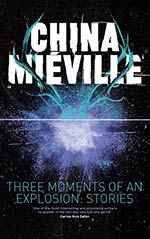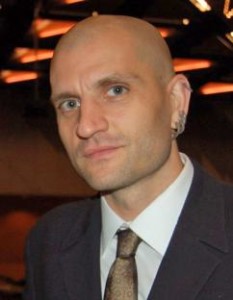
![]() charlesdee
charlesdee
12/13/2015
![]()
China Miéville is both a proponent and practitioner of New Weird writing. Some of you are probably ready to quit reading at this point. "New Weird" is a term that can seem both vague and unnecessary. Weird writing has its canon revolving around H.P Lovecraft and company with their themes of ancient evil and cosmic terror. Defining a new variety of weirdness can come down to a long list of writers who to greater or lesser degrees produce it - whatever exactly it is. Is it just a more explicit, visceral version of what came before, or is it marked chiefly by its effort to incorporate literary ambitions that divorce it from its pulp origins?
Whatever the case, it is staking out its territory in the speculative fiction arena. Anne and Jeff VanderMeer, who in 2011 established a weird canon with the 1100 page anthology, The Weird, A Compendium of Strange and Dark Stories, had already in 2008 anthologized 30 stories and essays as The New Weird. This year, weirdness enters the crowded arena of annuals with Laird Barron editing The Year's Best Weird Fiction, Volume I. (If they have come out in the past year, I assume they are "New" Weird by default.)
Miéville contributed both a story to the VanderMeers' 2011 anthology and an "Afterweird: The Efficacy of a Worm-eaten Dictionary." He addresses the origins of The Weird without making a specific case for the new variety, but his arguments give a good picture of how his personal vision has been formed. He starts by leading us down an etymological dead end, deriving "weird" from the Anglo-Saxon "wyrd," a word conjuring a vision of fate and doom as a "cat's cradle, intricate and splendid as a Sutton Hoo buckle." He proposes that the weird could be the feral child of the wyrd, but then, in Miévillian fashion, pulls the rug from his own argument. "What if etymology is fucking useless?" Late 19th and early 20th century writers did not engage their Gothic fathers in an Oedipal struggle to develop a new language. Theirs was not a new literature of fatefulness but its rebuke.
The fact of the weird is the fact that the worldweave is ripped and unfinished. Moth-eaten, ill-made. And through the little tears, from behind the ragged edges, things are looking at us.
(You may either read that last bit as a simple declarative statement, or creep it out with internal italicization:things are looking at us.)
His verdict on the VanderMeer anthology: "This is a worm farm. These stories are worms."
The stories in Three Moments of an Explosion can get pretty wormy. The book is not announced as an exercise in New Weirdness, but the publisher drops a hint on the back cover. We are told to expect "a cast of damaged yet hopeful seekers who come face-to-face with the deep weirdness of the world - and at times the deeper weirdness in themselves."
Miéville titles this 400-page collection after the three paragraphs of science fiction that opens it. In an unspecified future, a crowd gathers to watch the destruction of a derelict warehouse. At the moment of the explosion, three intrepid thrill seekers ingest tachyon laced MDMA and rush into the collapsing building. They experience it in a moment outside of time. The drug begins to wear off, and only two make it out alive. But two out of three's not bad, and the thrill was worth it.
Perhaps Miéville is letting us know that he will be slipping us the tachyon/ecstasy pill for each of the upcoming tales, leaving us wide-eyed observers suspended in his visions of collapse and morbid wonders.
To lure us in he opens with "Polynia", a crowd pleaser about giant icebergs appearing in the sky over London. It's an offbeat coming-of-age story that progresses from boyish adventure to adult lives lived in an irrevocably changed world.

China Miéville
After "Polynia," things turn darker and tend to stay there. "Rope" is another sf story, but the mood is dour. Earth has long ago perfected the technology for space elevators, but we have not been able to keep them in good operating condition. A telling moment comes when intergalactic visitors have to feign interest in our pitifully out-of-date wonders. When he leaves sf behind, Miéville cranks up the weirdness dial in stories set in dismal worlds peopled by anxiety-ridden characters performing tasks that have lost their meaning and pursuing lives that offer no safeguards against the chaos engulfing them.
"The Buzzard's Egg" takes place in a time of religious wars where the battles involve capturing the enemy's god. In a remote tower, an old man tends to an old god with whom he's grown quite fond. But the tides of war are changing. Miéville's writing here takes on the tone of a Samuel Beckett monologue. In "Estate," a young man, now living alone in his family's house, is kept awake nights first by birds, then foxes, then rowdy kids. An acquaintance he hasn't seen since his schooldays returns, and soon the old neighborhood is going up in flames. In "Keep," the world succumbs to a disease that causes circular fissures to surround the infected. These fissures eventually swallow up entire cities, leaving the sufferer on a small island of solid ground, hence the title "Keep." (You would probably have to read that one to have any idea what I am trying to describe.)
If you have read much Miéville, you know that it is wise to keep the dictionary app open while you proceed. "The Dusty Hat" has a dense, baroque verbal style perhaps meant to serve no other purpose than to put the reader as out of his depth as is the story's left-leaning protagonist who slides into a phantasmagoric world of politics made corporeal. (Again, just read it.)
Since I was reviewing this book, I read it through from start to finish. Normally if I were to take up a book like this I would pick may through it, skipping around and possibly never reading every story. So for full disclosure purposes, looking back over the table of contents, I see titles that no longer mean anything to me, and I question the accuracy of my memories of other stories. What I remember most clearly is Miéville's ability to find a new voice specific to each story. His American movie critic narrator of "Junket" is fully realized and far removed from the medical student in 1930's Glasgow who tells the tale in "The Design." It's true that you are often left marveling at the author's virtuosity rather than caring about the characters, but I don't see that as the negative quality some readers report.
I also don't agree that Miéville's stories are poorly plotted and tend to wind down rather than end. They don't wind down. The bottom falls out, taking you with it. And as Miéville said in his attempt to define the essence of Weird fiction, while in free fall you dread that you are about to learn exactly what those things are that are looking back through the holes at us.